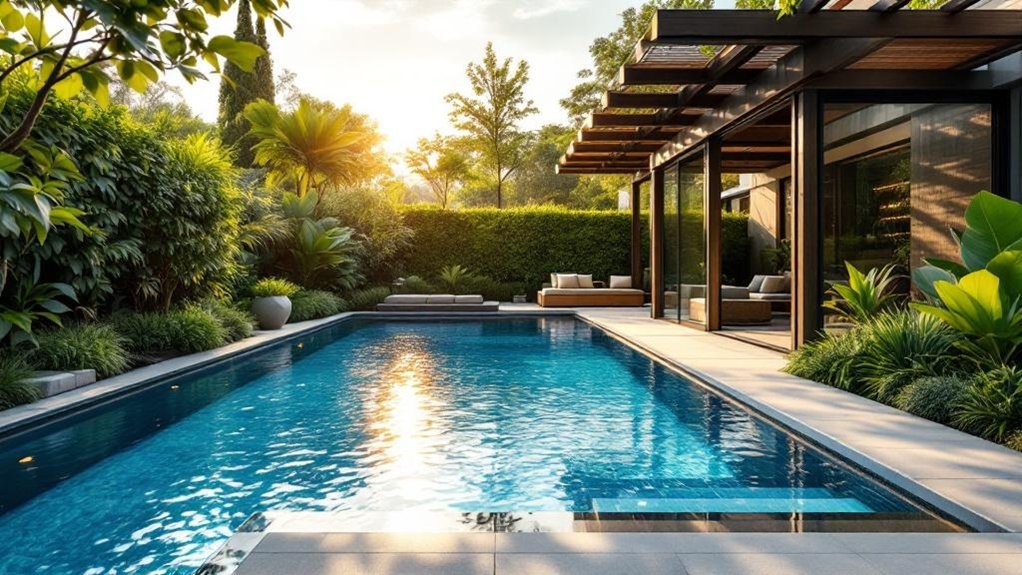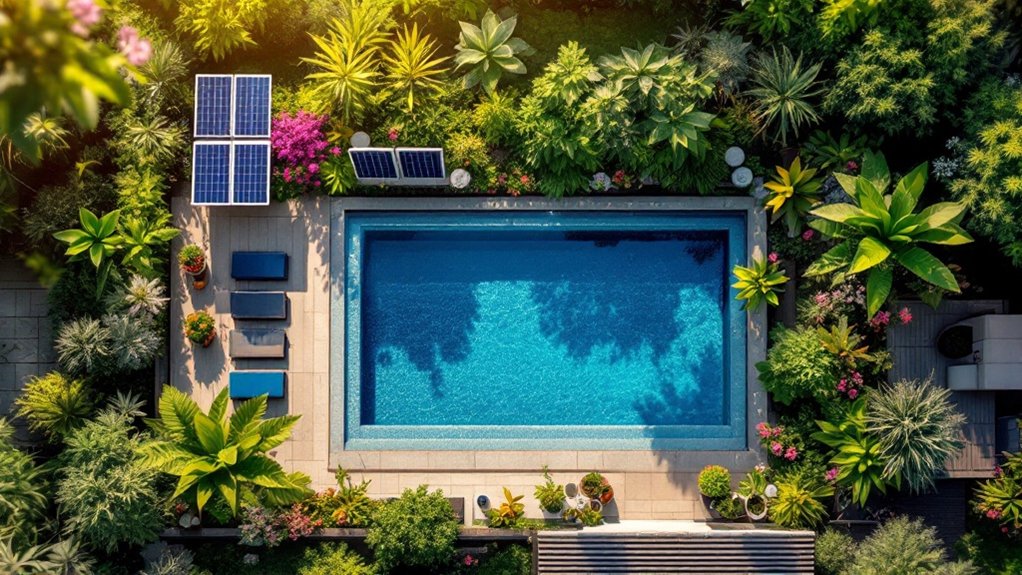As sustainability becomes increasingly important in design, innovative pool concepts for 2024 are emerging. These ideas focus on eco-friendly materials and energy-efficient technologies. Natural swimming pools, solar heating, and advanced water management systems are at the forefront. Additionally, the use of recycled materials enhances both aesthetics and environmental responsibility. Exploring how these elements can work together offers insights into creating truly sustainable outdoor spaces. What other trends might shape the future of pool design?
Embracing Natural Swimming Pools
As homeowners increasingly seek eco-friendly alternatives, embracing natural swimming pools has emerged as a popular trend. These innovative pools utilize biological filtration systems, allowing water to be cleaned and purified through natural processes involving plants and beneficial microorganisms. Unlike traditional pools, natural swimming pools create a harmonious environment that blends seamlessly with the surrounding landscape, often featuring lush vegetation and stone accents. This design not only enhances aesthetic appeal but also promotes biodiversity by attracting local wildlife. Additionally, natural pools require fewer chemicals, reducing environmental impact and improving water quality. With minimal maintenance and lower operational costs, these pools offer a sustainable solution for those looking to enjoy the joys of swimming while prioritizing ecological responsibility.
Solar-Powered Pool Heating Solutions
Solar-powered pool heating solutions offer numerous benefits, including energy efficiency and reduced utility costs. As homeowners consider installation, factors such as system size and orientation become essential for ideal performance. Over time, the cost savings associated with solar heating can greatly outweigh initial investment expenses. Additionally, modern systems can provide dependable performance even in varying weather conditions, ensuring consistent heating for pool enjoyment.
Benefits of Solar Heating
When considering eco-friendly options for pool heating, the benefits of solar heating stand out as a compelling choice. This renewable energy source harnesses sunlight, greatly reducing reliance on fossil fuels and lowering greenhouse gas emissions. Solar heating systems are cost-effective, as they can lead to substantial savings on utility bills over time. Additionally, these systems have low maintenance requirements, enhancing their appeal for pool owners. By utilizing solar energy, homeowners contribute to environmental sustainability while enjoying a comfortably heated pool. Furthermore, solar heating can extend the swimming season, allowing for year-round enjoyment. As technology continues to advance, the efficiency and effectiveness of solar heating solutions are expected to improve, making them an even more attractive option for eco-conscious consumers.
Installation Considerations
Installing solar-powered heating solutions for pools requires careful planning and consideration. Homeowners must assess their pool’s size, orientation, and local climate conditions to determine the most effective solar panel system. It’s vital to select a location for the panels that maximizes sun exposure throughout the day while avoiding shade from nearby trees or structures. Additionally, the roof or ground space chosen for installation must support the weight and design of the solar panels. Proper plumbing and electrical connections are essential for efficient operation, so consulting with professionals for installation and maintenance is advisable. Finally, local building codes and regulations should be reviewed to guarantee compliance and optimize the overall performance of the solar heating system.
Cost Savings Over Time
While many homeowners initially focus on the upfront costs of solar-powered pool heating solutions, the long-term financial benefits can be substantial. By harnessing the sun’s energy, these systems dramatically reduce or even eliminate monthly heating bills. Over time, savings accumulated from decreased reliance on traditional energy sources can offset installation expenses, often leading to a return on investment within a few years. Additionally, solar pool heaters require minimal maintenance, further reducing ongoing costs. Many regions also offer incentives or rebates for solar installations, enhancing affordability. As energy prices continue to rise, the appeal of solar heating becomes increasingly attractive, allowing homeowners to enjoy extended swimming seasons while contributing to environmental sustainability.
Water-Saving Filtration Systems
Although traditional pool filtration systems consume considerable amounts of water, innovative water-saving filtration technologies are emerging as essential components of sustainable pool design for 2024. These advanced systems utilize techniques such as pressure filtration and UV treatments, which require less water for backwashing and maintenance. Additionally, many of these filtration systems are designed to minimize water loss through evaporation and leaks, ensuring pools remain efficient and eco-friendly. Incorporating dual filtration methods can also enhance water clarity and quality while reducing chemical usage. By adopting these technologies, pool owners can considerably decrease their water consumption, contributing to broader environmental conservation efforts. Ultimately, water-saving filtration systems represent a transformative step towards more sustainable and responsible pool ownership in the coming years.
Recycled and Upcycled Pool Materials
An increasing number of homeowners are turning to recycled and upcycled materials in their pool construction and renovation projects. This trend reflects a growing awareness of environmental sustainability and resource conservation. Reclaimed wood, for instance, is popular for decking and fencing, providing aesthetic appeal while reducing deforestation. Additionally, recycled glass tiles are often used for pool finishes, adding vibrant colors and unique textures without the environmental cost of new materials. Concrete from demolished structures can be repurposed for pool bases or surrounding patios, minimizing waste. By choosing these innovative materials, homeowners not only enhance their outdoor spaces but also contribute to a circular economy, promoting sustainability and reducing their carbon footprint in the process.
Eco-Friendly Pool Covers and Liners
The movement towards sustainable pool design extends beyond materials to include eco-friendly pool covers and liners, which play an essential role in maintaining the environmental integrity of swimming pools. These covers are typically made from recycled or biodegradable materials, reducing waste and the carbon footprint associated with traditional options. They serve multiple purposes, including minimizing water evaporation, lowering energy costs for heating, and preventing debris accumulation. Additionally, innovative designs enhance durability and functionality, ensuring long-term use. By opting for eco-friendly covers and liners, pool owners can contribute to a more sustainable lifestyle while still enjoying the benefits of their pools. As awareness of environmental issues grows, the demand for these sustainable solutions is expected to rise considerably in 2024 and beyond.
Smart Technology for Water Management
Smart technology is revolutionizing water management in pool design, offering solutions that enhance sustainability. Automated water filtration systems and smart irrigation integration work together to optimize water usage and maintain cleanliness. Additionally, real-time water monitoring provides pool owners with valuable insights, ensuring efficient management and conservation of resources.
Automated Water Filtration Systems
Automated water filtration systems represent a notable advancement in pool management technology, enhancing both efficiency and sustainability. These systems utilize intelligent sensors and real-time data analysis to monitor water quality, adjusting filtration cycles accordingly. By optimizing energy use, they considerably reduce operational costs and environmental impact. Automated systems can detect contaminants and balance chemical levels, ensuring a consistently clean and safe swimming environment. In addition, they minimize manual intervention, allowing pool owners to focus on enjoyment rather than maintenance. Integration with smart home technology enables remote monitoring and control, providing convenience and peace of mind. As pools evolve into eco-friendly spaces, automated filtration systems play an essential role in achieving sustainable water management practices for the future.
Smart Irrigation Integration
While traditional irrigation methods often lead to water wastage, integrating smart technology into pool landscaping greatly enhances water management. Smart irrigation systems utilize weather data, soil moisture sensors, and advanced algorithms to optimize water usage, ensuring that landscaping receives the right amount of water at the right time. This technology can considerably reduce water consumption compared to conventional irrigation methods. Additionally, smart systems can be programmed to adjust watering schedules based on seasonal changes, rainfall, or temperature fluctuations. By incorporating these systems, pool owners not only promote sustainability but also reduce maintenance efforts and costs. Ultimately, smart irrigation integration represents a forward-thinking approach to landscape management, aligning with the growing emphasis on eco-friendly practices in pool design.
Real-Time Water Monitoring
Real-time water monitoring systems have emerged as an essential component in the quest for efficient water management in pool design. These advanced technologies utilize sensors to track various water quality parameters, including pH levels, chlorine concentration, and temperature. By providing instant feedback, they allow pool owners to make informed decisions, reducing chemical usage and ensuring ideal water conditions. This not only enhances swimmer safety but also lowers maintenance costs. Additionally, some systems can integrate with smart home networks, offering remote monitoring and control through mobile applications. As sustainability becomes increasingly important in pool design, real-time monitoring presents an innovative solution, promoting responsible water usage while maintaining a pristine swimming environment. This technology represents a significant step toward eco-friendly pool management practices.
Integrated Landscaping for Biodiversity
Incorporating integrated landscaping for biodiversity is essential for creating sustainable pool environments that harmonize with nature. This approach involves designing landscapes that foster native plants, which provide habitats for local wildlife and promote ecological balance. By selecting drought-resistant flora, property owners can reduce water consumption and maintenance needs. Additionally, incorporating features such as rain gardens and permeable paving can enhance natural water filtration, moreover benefiting the ecosystem. Integrating trees and shrubs around pools not only creates shade but also supports bird and insect populations, contributing to a healthier environment. Furthermore, utilizing organic landscaping practices minimizes chemical use, aligning with sustainable principles. Overall, integrated landscaping plays a critical role in establishing a thriving, biodiverse pool setting that benefits both humans and wildlife alike.
Sustainable Pool Lighting Options
Creating a sustainable pool environment goes beyond landscaping; it also encompasses thoughtful lighting choices. Energy-efficient LED lights have become the preferred option for pool illumination, as they consume considerably less energy than traditional bulbs and last much longer. Solar-powered lights offer another eco-friendly alternative, harnessing sunlight during the day to provide illumination at night without relying on electricity. Additionally, smart lighting systems allow homeowners to control brightness and timing, optimizing energy usage and enhancing the overall ambiance. Moreover, using underwater lights can create stunning visual effects while minimizing light pollution. By selecting sustainable lighting options, pool owners contribute to environmental conservation while enjoying a beautifully lit space that complements their eco-friendly design. Incorporating energy-efficient designs not only enhances the aesthetics but also promotes a greener lifestyle.
Frequently Asked Questions
How Much Does a Sustainable Pool Renovation Typically Cost?
The cost of a sustainable pool renovation typically ranges from $15,000 to $50,000, depending on factors such as size, materials, and technology. Homeowners should consider long-term savings and environmental benefits when evaluating expenses.
What Are the Maintenance Requirements for Natural Swimming Pools?
The maintenance requirements for natural swimming pools involve regular monitoring of water quality, managing plant life, occasional cleaning of filters, and ensuring proper balance of nutrients. Routine checks are essential for sustaining a healthy aquatic ecosystem.
Are There Specific Plants Recommended for Integrated Landscaping?
Certain plants are ideal for integrated landscaping, including native aquatic species, ornamental grasses, and perennials. These plants not only enhance aesthetic appeal but also contribute to ecological balance, promoting biodiversity within the surrounding environment.
Can I Install a Solar Heating System on Any Pool Type?
The individual wondered if a solar heating system could be installed on any pool type. Generally, most pool types accommodate solar heating, though specific installation requirements and compatibility factors should be considered for peak efficiency.
How Do Smart Technologies Improve Pool Water Quality?
Smart technologies enhance pool water quality by utilizing sensors to monitor chemical levels, automatic filtration systems to maintain clarity, and automated cleaners to reduce debris, ensuring a healthier swimming environment while minimizing manual maintenance tasks.
Conclusion
To sum up, the innovative sustainable pool design ideas for 2024 reflect a growing commitment to environmental stewardship. By embracing natural swimming pools, utilizing solar energy, and incorporating recycled materials, these designs not only enhance aesthetic appeal but also promote ecological balance. Advanced water management systems and integrated landscaping further support local biodiversity. As homeowners increasingly prioritize sustainability, these trends represent a significant shift towards creating outdoor spaces that are both beautiful and environmentally responsible.




